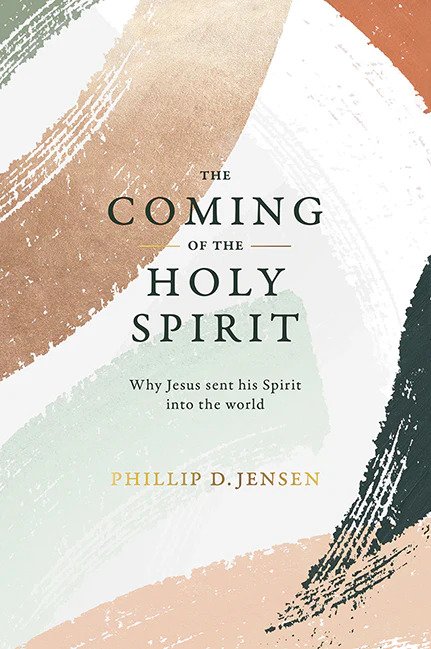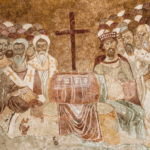I think the highest compliment I can pay Phillip Jensen’s The Coming of the Holy Spirit is to say that I found it pretty much what I was expecting because the author had already convinced me of it at an AFES national conference in 1992.
I can’t remember a lot of talks from my university years, but I can remember that series very clearly. I remember Phillip explaining why Nicodemus should have understood what Jesus was talking about in John 3—because the Old Testament promised a new birth through the Holy Spirit. I remember him unpacking what it meant to be “filled with the Spirit” from Ephesians 5. I remember him challenging us to be led by the Spirit in the sense that Paul describes it in Romans 8 and Galatians 5.
Those talks were provocative in the best way. Phillip took the spiritual buzzwords and catchphrases of evangelical culture and showed us how our standard understandings of the expressions differed from the patterns of Scripture. He showed us that the spiritual life wasn’t something beyond the ordinary Christian life but that a Christian life—lived through the power of the gospel—was fundamentally spiritual.
Anyway, this book has all of that good stuff and much more.

The Coming of the Holy Spirit: Why Jesus sent his Spirit into the world
Phillip D. Jensen
The Coming of the Holy Spirit: Why Jesus sent his Spirit into the world
Phillip D. Jensen
When we seek to understand the person and work of God’s Spirit, we are often so concerned with personal theories or current controversies that we fail to listen carefully to what God himself teaches in the Scriptures.
The Coming of the Holy Spirit begins with the very centre of what the Bible teaches about the Spirit: Jesus will fulfil the Old Testament prophecies and pour out the Holy Spirit on his people. The book explores the five promises of Jesus about the Spirit in John 14-17 and then traces the fulfilment of those promises through the rest of the New Testament.
Unpacking Jesus’ Promises
As he did in ’92, Jensen begins with Nicodemus and the expectation of the Spirit in the Old Testament before moving on to the Farewell Discourse (John 14-17). From this opening, he outlines five basic promises that Jesus gives concerning the Spirit, along with cautionary notes about what Jesus isn’t saying. Jesus promises that the Spirit will:
- Be with all his followers (no matter how they feel).
- Remind the apostles and teach all believers to know and obey Jesus (in contrast to purely mystical or intellectual versions of the faith).
- Testify about Jesus and enable his people to testify about him, too (though the Spirit is not interested in testifying about himself).
- Make people understand sin and how Jesus has overcome it; and
- Reveal all truth as he points to Christ.
Unpacking those takes the rest of Part 1. In Parts 2 & 3, we read about the significance of the Spirit’s arrival at Pentecost and his (the Spirit’s) role in the spread of the gospel around the world. With the death and resurrection of Jesus, the end days have arrived—and this decisive change is confirmed by the Spirit coming to change blind eyes and dead hearts so that people can see and believe the truth.
Reimagining Spirituality
The final Part (4) moves on to a discussion of the Spirit in the Christian life, and it is here that Jensen does most to show the contrast between biblical spirituality and its contemporary descendants. He contextualises phrases such as “led by the Spirit” and “filled by the Spirit” to demonstrate how they have come to mean something unlike what the apostle Paul had in mind. He re-centres the gospel and the ordinary Christian virtues (for example, Galatians 5:22-23) as the hallmarks of the spiritual life.
Most powerfully and persuasively, he warns us against looking to Corinth for inspiration. Though they were obsessed with spiritual gifts (whatever that phrase means), the Corinthians’ pride and factionalism showed that they were not “spiritual” but “merely human” (1 Cor 3:1-4). As Jensen writes:
Strangely to our ears, the most ‘charismatic’ church in the New Testament is in fact the most unspiritual. The church over whom most has been written on charismatic questions in modern times was in its own time viewed by the apostle not as a beacon of spirituality, but carnality. (283)
Or again, contrasting Corinth with Ephesus:
In their unspiritual minds, the Corinthians failed to understand that character is more important than competence, convictions are more important that curiosities, caring for others is more important than consoling oneself, and edification is more important than experientialism. (305)
I find these bracing summations as fortifying today as I did thirty years ago. Listening to Jensen (and reading Peter Adam’s wonderful books on Word-spirituality) cured me of my spiritual inferiority complex. These days I am less impressed by showy supernatural claims, having seen the subsequent apostasy of many who claimed them. But Jensen’s clarity is still welcome and timely.
He showed us that the spiritual life wasn’t something beyond the ordinary Christian life but that a Christian life—lived through the power of the gospel—was fundamentally spiritual.`
I think it might stand out more in a shorter book, however. My main quibble with The Coming of the Holy Spirit is that it is harder to get through than it needs to be. After the end of Part 4, we get no less than 34 appendices, bringing the page count to 480. Many of these chapters provide fascinating arguments and excellent correctives, but their inclusion compounded the impression that the book was an assembly (perhaps drawn from disparate sermons?) rather than an entirely cohesive whole. It seems that I always say this about big books, but it would be a great thing if Phillip could give us a short version to go with it. A more concise book could reach more readers.
But complaining of too much of a good thing is a relatively mild criticism. There is so much good here. As an exhaustive reference, The Coming of the Holy Spirit is a great gift to ministers and thoughtful Christians. May it be widely read. May it encourage and challenge even more of God’s people than the talks that preceded it.















